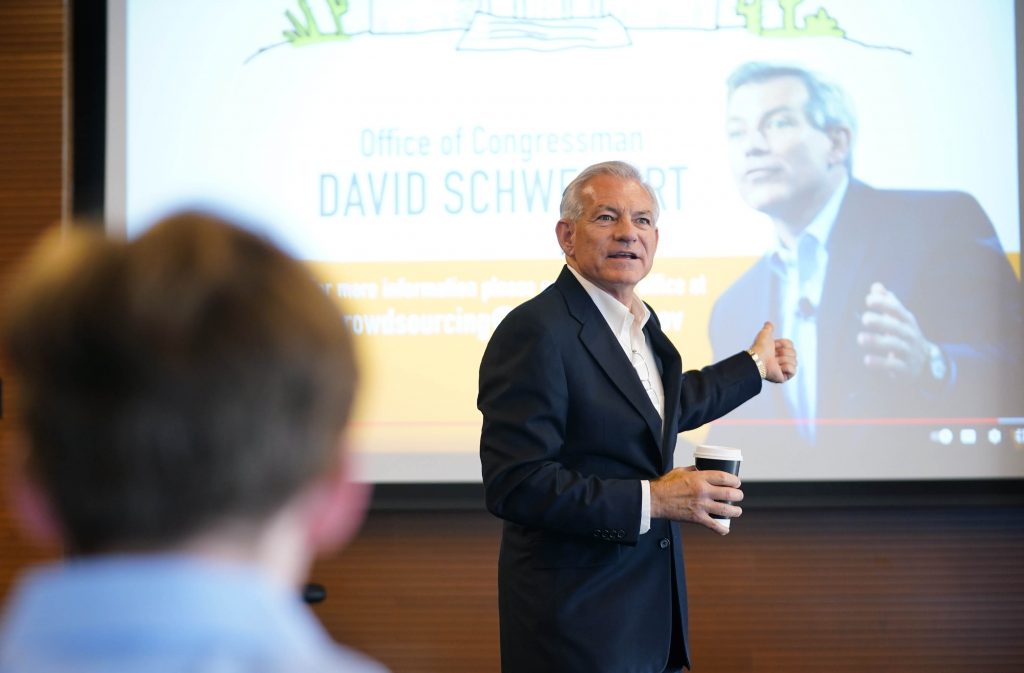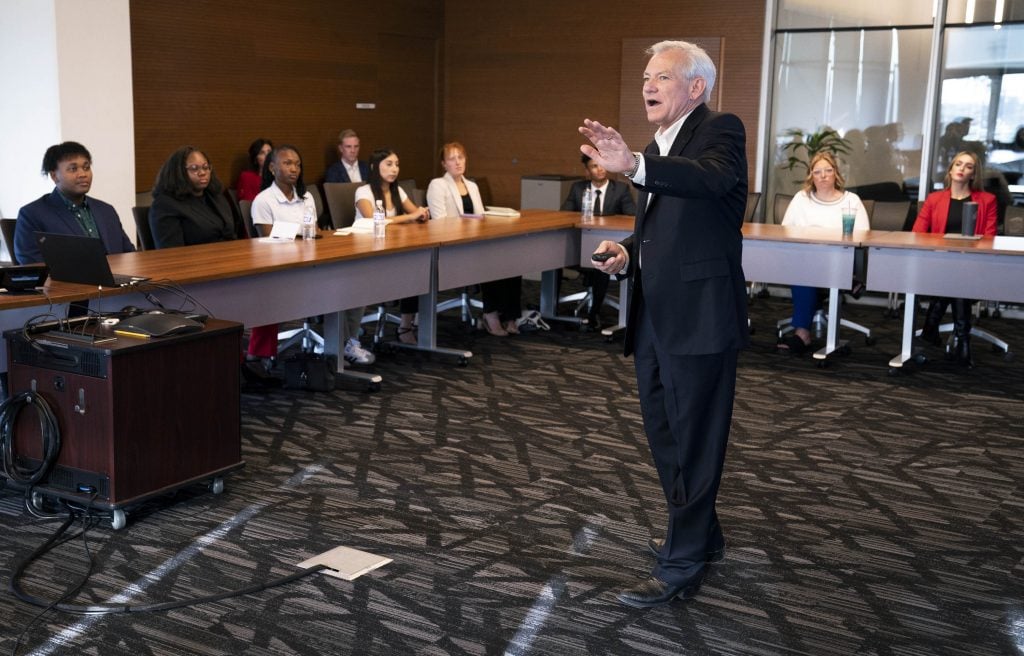
Photos by Ralph Freso
If you want to be a future-fixer, be a disruptor.
It was the advice U.S. Rep. David Schweikert (R-Ariz.) shared with Grand Canyon University students Monday in the Student Life Building at the fall semester’s first Public Square Series talk, a monthlong series of speaking engagements featuring notable legislative, community and nonprofit leaders as they discuss public policy challenges.
“My argument to you is, I need you to think disruptively,” said Schweikert, who shared some big numbers with students from the student body and GCU’s Canyon Civic Institute, an Honors College-housed civic group that organizes the series.
Schweikert posed this question: “What is the greatest threat to your generation?” then introduced a term to students that they might not know, “cross-generational wealth transfer.”
What it means is this generation of college-age youth is footing the bill for the older generations.
Every dime Congress votes on is borrowed money, Schweikert said, and by the time GCU students are in their peak earning years, between the ages of 45 and 54, “We will double every single U.S. tax just to maintain a baseline.”
He added that projections have shown that college-age students are going to be about $124 trillion in borrowed money in 30 years and that for every dollar the federal government takes in, it spends $1.39.
The top four buckets all that spending goes to?

Defense is No. 4, Medicare No. 3, interest No. 2 and No. 1 in spending? Social Security.
These numbers aren’t Republican, he said, or Democrat.
“It’s math,” he said, and the federal government is a math-free zone because no one wants to tell the truth, and the truth is, “The math is brutal.”
When voters approach Schweikert and demand a balanced budget, “I can do it,” the long-serving U.S. House of Representatives member told students. “But I’d have to get rid of all the military, all of government, and then you have to tell me which part of Medicare or something of that nature you want me to get rid of.”
The numbers would be difficult to balance without making those tough decisions.
“The math gets a little higher,” he said. “Every day, we have about 13,000 Americans that turn 65, and we made a societal deal with them that you get your Medicare and you get your Social Security if you worked your 40 quarters.”
Schweikert spoke about some other big numbers, this time in health care: 33% of U.S. health care spending is on diabetes, and 47% of health care spending is on obesity.
It’s the fifth year in a row that prime-age males are dying at a younger age.
“The single greatest thing to do is to not bury your generation,” in all those big numbers, said Schweikert, who was accompanied on his talk by Jagaar Halverson, former Associated Students of GCU president and now a field representative/caseworker for Schweikert.

Keeping health care costs down would require innovation and a bold change to the system, he added, like using a $7 sensor that can detect sepsis.
That technology exists, he said. It’s a piece of tape that detects the slightest changes in body temperature that could signal an infection and for doctors to start antibiotics early so it doesn’t cost hundreds of thousands of dollars in medical care.
“But you’d be shocked. We’ve been actually lobbied not to make them available,” Schweikert said.
“We have the technologies,” he added, but embracing those kinds of innovations means the less earnings for companies invested in treating those illnesses and the loss of jobs in that industry.
He also spoke of another big health care cost: patients not taking their medication.
Seven million working-age men are not working. A big reason for that is drugs, he said. But researchers have discovered that another big reason is obesity.
Schweikert said $600 billion annually is spent on health care related to obesity. “That $600 billion we’re spending, that is somebody else’s income,” he said, reminding students that the money the government spends is borrowed money.
“I want to know how you’re going to disrupt society,” Schweikert said. “I beg of you, think differently.”
Jonah Rominski, co-chair of the Canyon Civic Institute, spoke of the importance of the Public Square Series in “providing civic engagement on our campus.”
In addition to inviting speakers such as Schweikert, the group has been pushing the importance of voter registration through tabling events.
“And throughout the year, we’re hosting judges, lawyers, other politicians," Rominski said. "They come on campus to speak to our students, and then we also outreach into our communities. We help with community events around Phoenix, especially on 27th Avenue.”
Upcoming Public Square Series speakers will be T.J. Mitchell, chief of staff for Maricopa County District 3 Supervisor Bill Gates, Oct. 17; Andrea Marconi, Director at Fennimore Craig, Oct. 21; and Steve Trussell, Arizona Mining and Rock Products, Oct. 28. The talks will start at 4:30 p.m. in the Engineering Building, Room 125.
Manager of Internal Communications Lana Sweeten-Shults can be reached at [email protected] or at 602-639-7901.
***
Related content:
GCU News: Government students encouraged to explore public service opportunities



































































